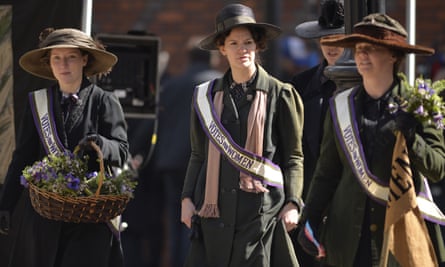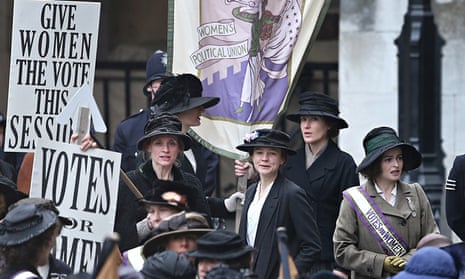The publicity campaign for the upcoming film Suffragette, which stars Meryl Streep as the British feminist Emmeline Pankhurst, saw Streep and three of the film’s other actors posing in T-shirts for Time Out with the Pankhurst quote: “I’d rather be a rebel than a slave.” I’m sure she and all the other white women in the film would. Although no doubt the writer Abi Morgan took great pains to be historically accurate when telling the story of the white feminists who fought to get votes for women in the early 20th century, here in 2015 feminists of colour are still trying to get our particular story into the collective consciousness. If it’s correct, that’s an added bonus.
so many words, such little patience pic.twitter.com/xU8e4DARYp
— Fariha Róisín (@fariharoisin) October 5, 2015
However compelled one is to whitewash a historical narrative – or to choose narratives that are majority white to convert into Hollywood films – if the marketing involves a bunch of famous white women wearing a T-shirt that evokes slavery, there’s going to be a problem. Because representation matters – in every medium, across every outlet, every single day. We are not fighting for the choice to tell stories dominated by white people, because clearly that choice is not in question. The white-lensed default is normative. We get it: in Britain, in America, the world over.
Women of colour are always the ones to carry this fact, internalise it. How does it not occur to white women – starting with the smart ones starring in this film – that their alabaster skin, clean white T-shirt and their “Rah, rah! I won’t be a slave!” message doesn’t burrow straight into the gut of women of colour who have suffered erasure from this feminist history and conversation since, well, the 1900s?
All year on various media platforms we have been talking about this very issue, from Girl Meets World 13-year-old star Rowan Blanchard’s poignant essay on the need for intersectional feminism, to the widely played out disconnect between Roxane Gay and Erica Jong at the Decatur Book Festival in September, where Jong suggested no one would know who Sojourner Truth was if not for Gloria Steinem. In addition to Blanchard’s piece, there have been a string of very smart thinkpieces on intersectionality, a term coined by black scholar Kimberle Crenshaw in the 1980s that is currently having a moment, but has also been a lived reality for women of colour for many decades.
That said, this particular film and its campaign is less about intersectionality in one movement and more about the impact of erasure full stop. We know that the history books have failed us. We know that for years we have given lip service to the notion that looking at where we’ve been will tell us where we are now, or where we are going in the future. But there is no conversation or accountability in the translation, as honourable an art form as film is, if all people see is the whiteness and the word “slave”. Few people will see this campaign, run home and Google Pankhurst to find out how or whether black women were integral to her fight – and those who will, in a desperate but familiar effort to find some evidence of our existence in this story, are black women and women of colour.

Researching we will, more often than not, come up dry. No evidence. Only a T-shirt, strident and boastful, hip and simple, that cuts right to the chase: we don’t see you. We don’t see you as rebels, and we don’t even see you as slaves. We see the term slave as user-friendly, synonymous with the worst possible alternative in any given dynamic, regardless of the humans who endured its very real existence.

Comments (…)
Sign in or create your Guardian account to join the discussion